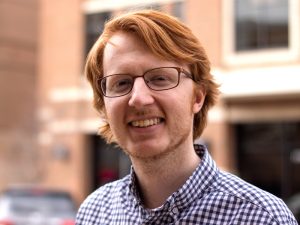
Mark Powers’ first experience with Computer Science came through learning to program his TI-84 calculator in the 9th grade; in particular by writing a program to solve the quadratic equation. He became intrigued by the possibilities of computer programming, and spent hours in class learning how to program the calculator by creating games and equation solvers. His exploration of computer science continued in the 11th and 12th grade as he took Java Programming. After graduating from Jenison High School, Mark headed to Hope College to study Computer Science, deciding against a Physics major so that he could focus exclusively on Computer Science.
Sounds like your typical computer science student story, right? Once you hear how Mark got introduced to Computer Science, you may have started thinking that Mark spends all of his time working on computers, probably in a dark room and most likely all by himself. But Mark’s fascination with and passion for computer science is broader than you might expect. He doesn’t keep up with new software or gadgets, nor does he know how to fix computers. While he enjoys programming, he finds the most enjoyment in exploring the theoretical side of the discipline, where he is able to see how he can push the limits of what is possible for computers. To Mark, programs lose their beauty when they are forced to be made practical, and so he is not particularly a fan of large software projects or the field of software engineering.
Instead, courses such as Discrete Structures & Algorithms and Programming Language Design & Implementation were some of his favorites at Hope. The programming languages course opened Mark’s eyes to all of the interesting problems in the field, which he calls “a great mix of theory, algorithms, and programming.” Learning how to think creatively using a variety of programming language paradigms and discovering how the processes of program compilation and interpretation work have inspired Mark to pursue a PhD in Computer Science at the University of Wisconsin at Madison in the field of programming languages. The communication skills and different ways of thinking he has developed as part of his liberal arts education at Hope will play a major role in his success as a graduate student.
My favorite parts of being a Computer Science student at Hope College have been working with the professors in class and on research, and also the great memories I’ve had with friends in the lab. I have cherished being part of the unique community in the Computer Science department.
In addition to course work, Mark also served as a help center associate and teaching assistant, as well as spending lots of time as a member of various research groups. He plans to build on these experiences after completing graduate school by becoming a professor. The Computer Science faculty are confident Mark will excel in this or anything else he takes on.

